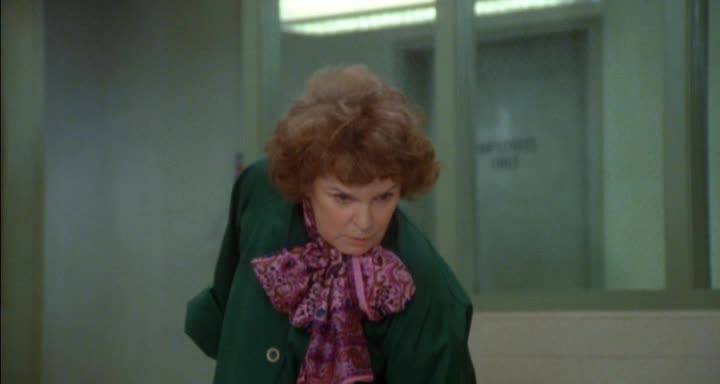Tim here. Now we come to the sad part of our centennial tribute to Mercedes McCambridge. For like so many movie stars, her career ended with a damp fizzle, not with any last triumphs. Worse yet, her career started rolling to a close in the 1970s, when Hollywood hit upon its most degrading scheme ever for what to do with its old legends and workhorses: stuff them into the enormous ensembles of tacky disaster films. At its most prestigious, this phenomenon resulted in Fred Astaire getting his solitary career Oscar nomination for The Towering Inferno. At its least prestigious, you have living legends Henry Fonda, Olivia de Havilland, and Fred MacMurray in a death race to see who can embarrass themselves the worst in The Swarm.
Or, for that matter, you have McCambridge herself, grossly misused and discarded in The Concorde... Airport '79. It's the fourth and final film in the rather dimwitted Airport franchise, which had once upon a time been kinder to its storied old troupers: 1970's Best Picture nominee Airport, the film that essentially got the disaster movie cycle rolling, netted Helen Hayes her second Oscar. But those days were long gone by the time McCambridge was called up to squander her talents along with the rest of a distressingly high-quality cast, including Alain Delon, Cicely Tyson, and David Warner. [More...]
Indeed, while McCambridge's role is barely present, she's neither the most conspicuously wasted figure ('70s camp icon Charo is present just long enough to be chased off a plane), nor the most despicably ill-used (the great Bergman muse Bibi Andersson is dragged in for two cringeworthy scenes to make bedroom eyes at a puffy George Kennedy, the reliable stalwart of the franchise), nor the most humiliating (Martha Raye plays a character whose solitary defining trait is a bladder control problem).
Make no mistake, though, McCambridge is not being challenged even slightly, and the filmmakers don't have a clue what to do with her.
She's an adjunct to a third-tier plot: she's the imperious gymnastics coach to a Soviet Olympic hopeful (Andrea Marcovicci) secretly in love with an American reporter (John Davidson), and they're all part of the assorted background color stuffed onto the Concorde for a flight to Moscow. By the time the plane takes off, McCambridge has suffered the same fate as pretty much every other ensemble member who isn't playing one of the cockpit crew, popping up in the background of shots to look alarmed when the film's director calls out "you just heard a banging noise".
Given the almost indescribably low demands of the part, McCambridge puts in as much effort as anybody else we ever see onscreen: in a film with Swedes playing Parisians and New Yorkers playing Russians, she's the only person in a film obsessed with Détente-era political tensions to actually speak with a Russian accent. But there's a firm upper limit to how much subtlety and depth of personality one can invest into a performance tallying up three minutes of total screentime if I am being wildly generous in my estimate, and with more reaction shots than lines of dialogue.

This shot is the nearest she gets to a close-up in the film. She doesn't say a word and fails to notice while the guy sits down.
There's nothing pleasant to derive from this little story, other than the ice-cold knowledge that Hollywood is awfully good at ignoring and devouring the screen legends who have served it well. McCambridge had one last film (the totally obscure 1982 horror film Echoes, also the final screen credit for fellow Supporting Actress Oscar winner Gale Sondergaard), and a handful of TV appearances before the industry disposed of her entirely, but Airport '79 is the last time she'd crop up in something even mildly prestigious that implied the producers had some sense that she was a respectable name.
The film itself is at least a campy marvel, a so-bad-it's-hilarious film that Universal ended up rebranding as a comedy during its initial run, the year before the beloved spoof Airplane! The ungainly, thudding lines of exposition, desperate stabs at raising stakes – the Concorde has to make a death-defying emergency landing at two different points in the film – and the over-the-top plot, in which an industrialist & arms dealer tries to blow up the plane mid-flight, so his reporter girlfriend can't tattle on him to the world newsmedia when she arrives in Moscow, all contribute to making this easily the worst film in its series. No small feat given that Airport '77 operated from the can't-win proposition, "what if we made The Poseidon Adventure, but with a plane?" But that's no comfort to those of us who've gathered here now to see the final major motion picture featuring Mercedes McCambridge, and instead end up with a callous reminder of how merciless the youth-obsessed machinations of the culture industry can be.

Related Reading:
McCambridge in Giant (1956)
McCambridge in All the King's Men (1949)
The High and the Mighty (1952) - the birth of those all star disaster epics
